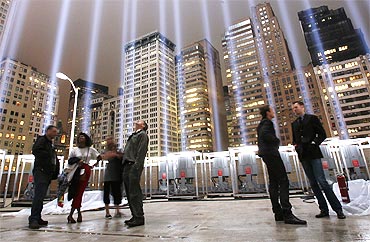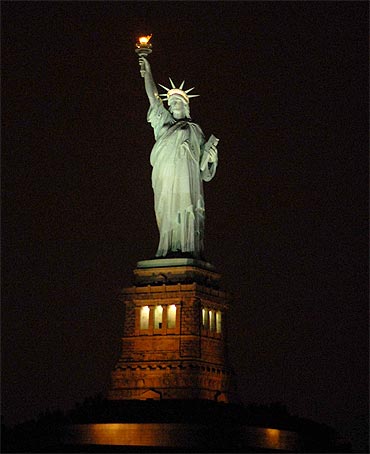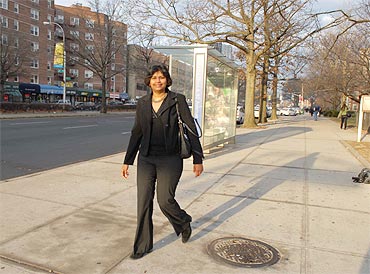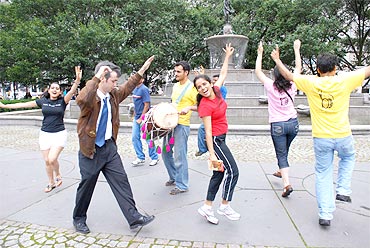 | « Back to article | Print this article |
Desis reveal what makes New York so special
In this special presentation, Rediff.com / India Abroad writers amalgamate various perspectives; assimilate diverse experiences to gauge the pulse of New York City.
To many people, New York City is good only for a visit or a stay of a year or two. You live here till you find a place to buy in the suburbs or on Long Island or in New Jersey.
'When are you moving out of New York?' is a question I faced for many years from my friends and family. Writes Arthur J Pais
 |
An editor of a newspaper (who happened to be from New York) had heard nearly 30 years ago that I was planning to leave Marquette University for City University (and then New York University). "Why do you want to come to this concrete jungle?" asked the man who had by then spent a decade in Manhattan.
"You will also need a lot of money to live anywhere in New York." I am glad I have proved him wrong. On a recent night as the legendary Portuguese singer Mariza was finishing her program at the Carnegie Hall, dozens of people were dancing in the aisles. One man, who I later learned was in his 70s, was dancing with such vigour that people were envying him.
After the show, as I waited in the line for the restroom, I spotted the man again and I told him how beautifully he was moving his body. He smiled but he was preparing to go out of the building. Suddenly, he turned to me and said, "You India?"
As I happily nodded, he forgot all about Mariza and began to sing Icheek dana Beecheek dana from Raj Kapoor's Shri 420.
He had perhaps learned the song growing up in Mozambique and from watching Hindi movies. Or he had Indian friends who showed him these movies. I did not get a chance to ask him. He left the building, humming the song and waving at me. As some people say, 'Only in New York only in New York.'
As someone who has spent nearly two decades in New York, I have run into many such chance encounters that are ingrained in my mind. Of course, some of the encounters I should not remember. A Pakistani cab driver looked at me, once, about three in the morning, and said, "You look like Salman Rushdie."
"Ha," I said. "But he happens to have a few millions unlike me."
I should not have said that. The man gave me a dirty look, "You know him?"
The taxi was half way through to my destination. Even then, I raised my voice firmly and said, "Not at all, not at all! What would I be doing with him?"
I can think of several bad things that have happened to me in the city: I have been mugged two times. But no one is really safe anywhere, not even in the White House. On the other hand, the joys, pleasures and life-affirming experiences one has in New York cannot be matched.
Click NEXT to read further..
'Only in New York..'
As an avid reader, you get to hear many major writers read from their books in New York. Of course, there are book readings in other cities as well, but somehow I feel New Yorkers take their writers more seriously, and give them plenty of love.
I have watched Arthur Miller, Ved Mehta, Orhan Pamuk, Abraham Verghese and Jhumpa Lahiri, John Irving and Albert Albee read here. At one reading against torture, the writers included Salman Rushdie, Paul Auster and Edward Albee. I closed my eyes and breathed reverentially, as if angels had descended into the hall, and I was breathing rare air.
I know many writers who have privately complained that their publishers would send them to cities around their home base so that the costs are kept down. "You haven't made it if you are not sent to New York for a reading," a San Francisco-based writer told me once.
To anyone who loves food (I have sampled food from more than 41 countries), movies (I have forgotten the numbers of junkets I have attended, meeting with Denzel Washington to Sandra Bullock), books (is there any bookstore more interesting than the Strand?) and scholarship (oh, how many Pulitzer and Noble laureates I have met here) New York is the ultimate city.
I remember Dame Judi Dench, the renowned stage, movie, and TV actress based in London, saying that though the London theater audiences are very good, 'you do not get the vibrancy there that you get in New York. The city has a great capacity to transform people.'
About a decade ago, my wife and I moved to San Jose, California, but within a year a new job brought us to New York. We could not quickly get a place in New York. An apartment in the building a friend was staying was vacant in Harrison, NJ. Reluctantly we moved to Harrison, but the big consolation was that Manhattan was just a 20-minute train ride.
Soon after we returned, the 9/11 happened, and soon came the war against the Taliban in Afghanistan. There were plenty of people who then said life had become tough for Muslims in America. And yet in the dead of the night and during the day I found lines in New York outside the halal carts run by immigrants from mostly Egypt, Afghanistan, Morocco and Lebanon.
I saw people reading Arabic newspapers on the subway. And I heard people chatting freely in Arabic or Urdu or Bangla, outside the mosques, on the subway, outside movie theaters and in the streets.
And I said, 'Only in New York only in New York.'
'It's not a Big Apple, but a small globe'
Activist and TV producer for Queens Public Television's Asian Indian Immigrant Experience, Nivedita Chandrappa, has been perennially fascinated by the many realities that make up New York, and been fascinated by the struggles and the heartaches new immigrants, especially from India, endure as they make their future, writes George Joseph.
Chandrappa, who has worked as a reporter in Indian publications in New York, and, in India, was a freelance feature writer at the Deccan Herald and Indian Express, says she deals with a city that is full of contradictions.
"I have lived in New York for about 14 years. I am not sure why people call this city the Big Apple; actually, it is a small globe where apples from all over come chasing the American dream," she says.
"In this city where immigrants flock, I have witnessed remarkable stories of people who have left their countries and families and come to this city and become like one of those vending machines," Chandrappa says.
"I might hate New York for its aloofness, but I also love New York because this is where people find their freedom -- of choice, of opinions, of celebrations, of living. Thousands come fleeing their conflict-ridden countries and embrace this city as their own. They also bring their ethnic diversity, culture, food and passion to this city and keeps it alive -- throbbing, burning and thriving," Chandrappa says.
Chandrappa is not insular and given to eating only at Indian restaurants and dressing in Indian clothes. When it comes to food, she revels in Thai, Malaysian, Continental, soul, Chinese, Spanish and other cuisines available in the city.
She also finds that despite its many charms, there is a bleaker side to living in one of the busiest cities in the world.
"I think it is hard to find friends in this city; most work two to three jobs, and travel all the five boroughs connected by intricate rails, forget about friendships. Most of them never see their families unless it is a weekend," she says.
But New York City handles its problems better than many cities, Chandrappa says. "I haven't been mugged, shot or swindled here, I have lived always in the same tiny apartment with two windows," she says, adding that while she does love New York, she is quite willing to consider life in one of those palatial homes upstate or in New Jersey.
'Them with more windows, space and a little garden, you know...'
'You should accept the city for what it is'
To many New Yorkers (and visitors), the subway is smelly, rat-infested and dangerous. But for Tania James, the acclaimed writer of the novel Atlas of Unknowns, the subway is uniquely a New York institution, one of the things she cherishes most in the city. She knows of its dangers, but still loves traveling by it. Writes Arthur J Pais
"You may connect occasionally with people you never want to meet," she says. "But you also make new friends, unexpectedly."
Once James saw a young girl running futilely to catch the train she was in. "I looked at her through the glass," James recalled. "I had been rooting for her but she missed the train. I looked at her with sadness in my eyes. She also looked sad. But it was a momentary feeling. I knew she could get onto the next train. We may never meet again but, for a brief moment, we were bonded."
In a subway car, a writer is fully occupied, James says. "You want to find out what people are reading. At times you find a person reading the same book as you. There is some form of kinship there. Then, you eavesdrop -- often unplanned. You hear intriguing stories, all kinds of conversations. There is never a dull moment. Besides, you see many colorful and unconventional people.
"You see snapshots: an older white gentleman reading a newspaper, and next to him a Hispanic kid doing pull-ups using the overhead railing. You never feel alone in a subway car. You feel you belong to a community. But to feel that way, you should change your attitude, and accept the city for what it is."
James was raised in Louisville, Kentucky, after a brief stint in Chicago till she turned four. She graduated from Harvard University in 2003 with a bachelor's degree in visual and environmental studies, with a focus in filmmaking. She received her Master of Fine Arts in fiction from Columbia's School of the Arts in 2006. She has been a New Yorker since, and cannot think of settling anywhere else.
"When I grew up in Kentucky, my movements were severely restricted because I had no car," she says, adding that she met friends in their homes' basements. "In New York when I see teenagers moving around so easily, I almost envy them."
For someone who loves greenery, New York is balm for the soul, she says. When she shows the best parts of Central and Prospect parks to visitors, including family and friends from Kentucky, they are amazed to see such greenery in the middle of the city.
As a writer, she also admires the libraries, seeing it as a privilege that anyone with a library card can use the second floor of the mid-Manhattan research library.
"You are there in this sprawling and ornate room," she muses. "Everything around is quiet and everyone is busy, writing or reading. You thank the city for this wonderful opportunity to think and work."



